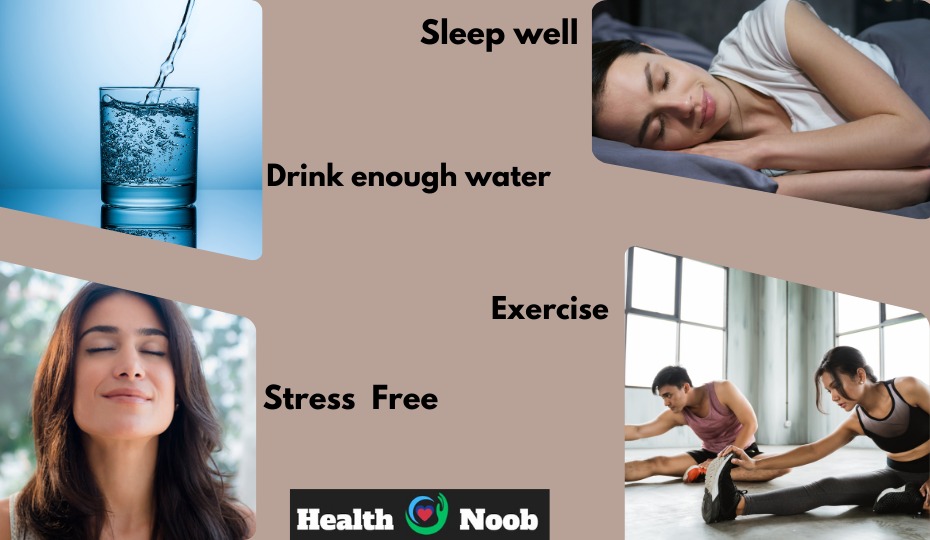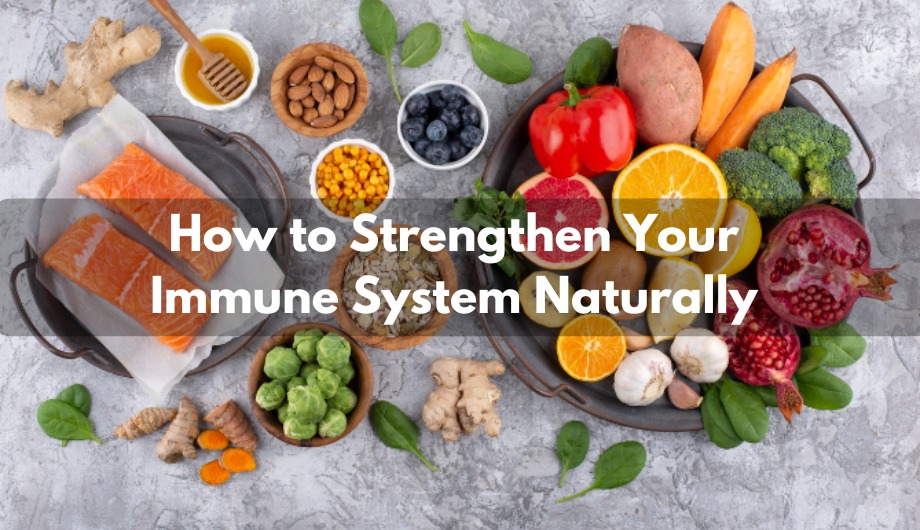Your defense system is very complicated. The immune system needs to be strong and smart enough to fight off many types of infections and diseases, but not so smart that it overreacts and causes allergies and other autoimmune diseases. Your immune system is tightly controlled by many things in order to keep that careful balance.
The immune system is the first thing that keeps you from getting sick. It is normal to want to know how to strengthen your immune system naturally. After all, the immune system’s job is to find and fight any outside threat, like viruses and bacteria. You can use the different methods we show you to make your defenses stronger.
What is the immune system
The immune system is made up of organs, tissues, and cells that work together to keep us safe from any germs.
Its main job is to keep an eye on our bodies and find any viruses, bacteria, or other harmful substances. There are two kinds of responses that our immune system makes when it senses a threat. On the one hand, it makes proteins called antibodies that work against virus proteins to stop them from spreading and entering new cells. On the other hand, it makes cells called cytotoxic work harder. These cells can tell which cells are infected with the virus and kill them.
Parts of the immune system
The innate immune system and the acquired immune system are the two main parts of our immune system.
- The innate immune system is something we all have and starts working as soon as we are born. This system starts working right away when it senses an intruder. When an enemy comes in, these defense cells wrap around it and keep it inside.
- Together with the innate immune system, the acquired immune system makes antibodies that keep our bodies safe from certain attackers. Our immune system varies during life, unlike the innate one. Here, we must optimize and find ways to strengthen it.
Weak immune system symptomps
These are some symptoms that our immune system is not completely well:
- Recurrent infections and/or colds
- Allergies
- Simple illnesses that last longer than normal, take a long time to heal, or get worse
- Frequent fever
- Dry eyes
- Habitual tiredness
- Nausea and vomiting
- Diarrhea
- Spots on the skin
- hair loss
We can also get some blood tests, which must be suggested by a doctor, to find out how healthy we are. These tests are:
- Hemogram
- Ferritin
- B12 vitamin
- Immunoglobulins
- Albumin
- Globulin
Read More: Body Recomposition Workout Plan : Build Muscle, Lose Fat!

How to strengthen your immune system naturally
If you want to improve your immune health, you may be wondering how to help your body fight disease.
While boosting your immunity is easier said than done, several diet and lifestyle changes can strengthen your body’s natural defenses, helping you fight off harmful pathogens or disease-causing organisms.
Here we present 6 tips of how to strength your immune system
Maintain a healthy diet
Your defense system works best when you eat well, just like the rest of your body. To do this, eat a lot of fruits, veggies, whole grains, lean proteins, and healthy fats.
In addition to giving your immune system the energy it needs, a healthy diet can help you make sure you get enough of the following micronutrients:
- Foods that have vitamin B6 include salmon, tuna, chicken, bananas, green veggies, and potatoes (with the skin still on).
- Vitamin C is found in oranges, strawberries, tomatoes, broccoli, and spinach, as well as citrus foods.
- Nuts, peanut butter, spinach, sunflower and safflower oils, and sunflower seeds all have vitamin E.
The best way how to strengthen your immune system naturally is to eat a healthy, well-balanced diet. This is because experts say that your body gets vitamins better from natural foods than from supplements.
Exercise regularly
Being active isn’t just a way to lose weight and feel better. It’s also good for you and helps keep your defense system strong.
One way that exercise can boost the immune system is by improving circulation. This makes it easier for immune cells and other chemicals that fight infections to move around the body.
In fact, studies have shown that even 30 minutes a day of mild to intense exercise is good for this body. Because of this, it is very important to stay active and work out daily.
Hydrate your body with water
Water is very important for your health and helps your immune system. Lymph is a type of fluid that moves through your body. It moves immune cells around your body to fight off infections. Lymph is mostly water. When you’re thirsty, your lymph moves more slowly, which can make your immune system weaker.
When you breathe, pee, and poop, you lose water all the time, even when you’re not working out or sweating. Make sure you drink enough water to refill the water you lose. You need to first figure out how much water you need.
Get enough sleep
Even though sleep doesn’t feel like a busy process, your body does a lot of important things when you’re not awake. For instance, while you sleep, important chemicals that fight infections are made.
It has been shown that people who don’t get enough sleep are more likely to get sick after being around bugs like the ones that cause the common cold. For the best immune system defense against sickness and infections, you should know how much sleep you should get each night and what to do if your sleep is being disturbed.
Minimize stress
Stress can appear quickly or build up over time. It’s important to know how it impacts your health, especially your immune system. When you’re under a lot of stress, especially chronic stress (which happens often and lasts a long time), your body starts a reaction. This body response weakens our immune system, making it more likely that we will get an infection or disease.
Everyone deals with stress in their own unique way, and so does the way they choose to ease it. Because being stressed can be bad for your health, you need to know how to tell when you are worried. Because of this, it is helpful to learn about things that can help you deal with stress, like deep breathing, meditation, prayer, or exercise.
Get your vaccines
The best part was saved for last: getting regular vaccines is the safest and most effective way to avoid getting infections like the flu, cervical cancer, and more. Many vaccines have been around for decades, but they are always being tested to make sure they are safe and successful, and they are changed so that they help the most people.

Vitamins to strengthen the immune system
Micronutrients make up the vitamins and minerals required by the body for most cellular functions.
The best way to obtain these micronutrients is through food. However, if we cannot meet our needs, it would be advisable to take supplements.
Vitamin C
The first line of defense when fighting germs are the linings of the nose, intestine and lungs where collagen plays an essential role.
Vitamin C is responsible for synthesizing collagen and without it, our body is not able to produce it.
It also boosts the production of enzymes and antibodies, which help the immune system fight off viruses and illnesses. It also possesses antioxidant and anti-inflammatory properties.
One of the greatest sources of vitamin C can be found in citrus fruits, kiwis, berries, peppers, spinach and papaya.
Vitamin E
It is a strong antioxidant that works on cells to make their walls stronger. It improves the performance of T lymphocytes, which are white blood cells that protect us from getting sick.
Some foods that are high in vitamin E are hazelnuts, sunflower seeds, peanuts, and veggie oils.
Vitamin D
One of the most important vitamins for our bodies is vitamin D. In the event of an infection, it turns on T cells and controls the production of cytokines.
Eggs and fish oils (like salmon, tuna, and sardines) are good sources of vitamin D.
Vitamin A
Vitamin A helps fight infections, and we can get it from animal foods like fish, meat, and cheese, or from plant-based carotenoids.
Carotenoids are natural chemicals that can be found in many plants. These are the pigments that give plants and flowers their color. These chemicals are antioxidants, and when we eat them, they change into vitamin A.
Some foods that have them are orange, tomato, broccoli, kale, lettuce, spinach, pumpkin, sweet potatoes, and pumpkin seeds.
Iron
Iron helps the body transport oxygen to cells. Our body can easily absorb iron through foods of animal origin (red meat, chicken, turkey, canned sardines, oysters, clams). However, in the case of being a vegetarian we can also find it in broccoli, beans, kale)
Selenium
Selenium helps our bodies make proteins that keep cells from getting damaged and make us stronger. Selenium can be found in both plant-based and animal-based foods. It can be found in foods like eggs, Swiss cheese, tuna, and wheat bran. The Brazil nut is the best natural source of this mineral. You can get all the selenium you need in a day from just one Brazil nut.
Zinc
All over the body, zinc is found in cells. It is important for the body to work right. As well as helping cells divide and grow, it also helps wounds heal and breaks down carbohydrates.
Eggs, crab, beans, yogurt, lean meats and fowl, and chickpeas are all good sources of it.

Immune system and age
Our immune systems get weaker as we get older, which makes us more likely to get sick. In wealthy countries, the number of age-related diseases has gone up along with life expectancy. What’s going on?
When it comes to older people, diet and immune health are closely linked. Micronutrient malnutrition is a type of malnutrition that can happen in developed countries right now. If you don’t get enough of certain vitamins and trace elements from your food, you may be micronutrient malnourished. People who are older tend to eat less and eat fewer types of foods. This makes their immune systems weaker because they don’t get as many vitamins.
If you don’t think your food is giving you all the micronutrients you need, maybe because you don’t like veggies, taking a multivitamin and mineral supplement every day can help your health and make sure your immune system is stronger.
FAQ
How to strengthen your immune system quickly?
Staying hydrated, getting enough sleep, eating a balanced diet full of fruits and vegetables, exercising frequently, controlling stress, and practicing good hygiene like handwashing will boost your immune system swiftly. However, improving your immune system takes time and commitment for long-term wellness.
How do you know if your immune system is strong?
Strong immune systems lead to fewer illnesses, faster recovery, vitality, and regulated inflammatory responses to infections and traumas. Regular doctor visits might also reveal immune system wellness.
How can I maintain good hygiene habits to support my immune system?
Practicing good hygiene, such as washing your hands frequently with soap and water, avoiding close contact with sick individuals, and cleaning and disinfecting frequently touched surfaces, can help prevent the spread of germs and support immune health.
Final Thoughts
Keeping your defense system strong is very important. And for all ages. Some illnesses, like joint pain, hair loss, or herpes, can be caused by a weak immune system. Microbiota and nutrients in our gut have been shown to be important parts of our defense system.
Having the right mix of bacteria in our bodies, eating well, and living a healthy life can all help our immune systems stay strong.
You can take care of your health and well-being if you know how to strengthen your immune system naturally






